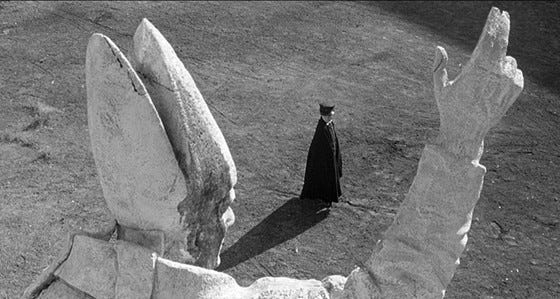In my latest video, I attempt to actually summarize what I think Martin Scorsese means when he says cinema:
“ [Cinema is] a type of experience: of leaving your house, to go to a place where you watch a film with other people. And the film you watch is not just a part of a commercial enterprise produced by a massive corporation and based around existing characters and material- but a unique individual story that is crafted and presented with special care to film language, tradition, and form.”
It’s a bit of a convoluted definition, but it’s an attempt to capture the nuance and awkward subtly of what exactly defines the medium vs other “moving image entertainment” that isn’t cinema. There’s a danger in attempting to define something almost esoteric in nature so concretely because there will always be exceptions and disagreements. But the attempt at a definitely is less about coming to a final agreement, and more about the value of the discussion along the way.
Ultimately, I think the crux of the issue centers around the over-commercialization of movies. In his essay Scorsese says:
In the movie business, which is now the mass visual entertainment business, the emphasis is always on the word “business,” and value is always determined by the amount of money to be made from any given property—in that sense, everything from Sunrise to La Strada to 2001 is now pretty much wrung dry and ready for the “Art Film” swim lane on a streaming platform.
Some people point out that cinema and film have always been commercial. And that’s true. They’re big budget operations that need to make money to pay for all the skilled labor it takes to produce them. But I think there’s a distinction to be drawn between an industry where the creation of a work is supported commercially and one where the commerce itself defines the nature of the work done.
In the video essay, I include a clip of Todd Philips, the director of Joker, talking about the difficult time he had getting Joker made at Warner Brothers. He mentions how some of their concerns about the kind of story Joker was centered around the fact that they “sell Joker pajamas at Target.” Ultimately this didn’t stop them from greenlighting the film, but you can easily imagine there are many scenarios where ideas or stories are passed on due to similar concerns.
The struggle between art commerce isn’t new to cinema. It’s as old as commerce itself. But that’s why I think these conversations are actually important. I think art is an important force in the world. Making a video essay like that, my goal isn’t to try to shift technological change, because that’s impossible, it’s to awaken awareness and curiosity in people to what’s out there, beyond the borders of mass-market entertainment.
Mass-market entertainment can be very enjoyable. It’s very entertaining, that’s a big part of why it’s popular. But its nature as a “mass-market” product means that it, almost by definition, will have a difficult time challenging the status quo. Something that can’t challenge the status quo, is limited in its ability to challenge you, and therefore change you.
Bo Burnham’s Eighth Grade, Carlos Estrada’s Blingspotting, Joanna Hogg’s The Souvenir, Kelly Reichardt’s First Cow, Lee Chang-dong’s Burning, and Terrence Malick’s A Hidden Life are all examples of recent cinema. None of these films will ever be as culturally renowned and financially successful as Avengers: Endgame. But that’s okay, for now, I’m simply happy that there’s still a place for them, that they’re available for me to watch, even if it’s not always in a theater, and that I can play a role in funneling what few people I can in their direction.
-TF





I really enjoyed this video and this letter. As with all of your videos, it has taught me a lot and got me thinking. But I think this one is probably one of your most important, and I haven't stopped thinking about it since I watched it early yesterday. I really liked how you refrained from saying these 'non-cinema' films are bad because they aren't cinema, which is something I often forget. Being the high-schooler I am, I'm quick to become that pretentious film enthusiast who says the Marvel movies are terrible, my friends don't know what good movies are because they like movies like those, and I am a film-genius. There were also lots of other points you made that really helped me to understand what cinema is and isn't, and how that plays into our modern media landscape.
After a year or two of following your videos, this is probably the video I will keep coming back to for a while.
For me, the distinction has grown clearer now. MCU is not ready to take risks, phases are announced, directors are not even given creative control. Edgar Wright was not able to direct Ant man because of their interference and the final product was just a dull film. MCU has become predicable and formulaic. There has been a commercial aspect throughout the history of cinema but the directors have always had a vision. It's not like I don't like MCU at all , I enjoy them but still there is nothing special now in their films.